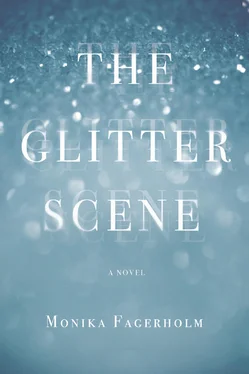It had been at home in the house after the funeral that Susette tried to explain that to her mother. Because suddenly, when they were alone again, the brothers with their families gone home, her mother in the kitchen furious at her, Susette. Because she had not stood next to her father’s deathbed where it had just been the two of them and called her father back. Not called together with her mother that he should not leave—
“You let him go. You let him go away.” Her mother had said that, of course not: “it was your fault Susette,” it would have been too much. Her mother understood that too, of course, because somewhere, at that time, she still had a certain mind for the possible and impossible. She was still also active in her position at the bank, even if she had been forced to go down to part-time due to her husband’s illness and also not had time for her position as secretary of the Bankers’ Employee Club. But in any case: if you deal with money, particularly other people’s money, you have to stay levelheaded, rational in your mind, she said that to herself many times, also earlier in life when she had still been normal .
But half a year later she was put on one hundred percent sick leave. Not a particularly large pension, but that, plus the widow’s pension and what Susette earned at the nursing home when she started working there after high school, had been enough so they could afford to stay in the large house .
And then everything had gotten out of control. As if there suddenly were two realities for Susette: one at home, one on the outside. But gradually it was the first reality that gained ground even though she did not want it to. The normal teenage life in the District, which she in and of herself never really was a part of, but it had existed like a background, but that background paled, disintegrated just like the fact that she had once had a real boyfriend too. Despite the fact that it had mostly been a youthful infatuation, Gustav Mahler’s music, Sunday dinners at the rectory. Was made unreal. Instead, the nursing home, the empty corridors, the old, the dying in their beds, and two very disobliging hospital cats who saw red at the sight of her .
“I didn’t let him go! You’re wrong, Mama!” In the beginning then, Susette had roared like a stuck pig when her mother suddenly accused her of having let her father go. And later, calmer, tried to explain the dignity and the importance of the dying one needing to find peace .
Her mother had started crying. Her wailing. But they had hugged, hugged and never fought again. Her mother had said, “There is a lot to cut up. Rags, fabric. Can you sharpen the scissors for me, Susette? My eyes are getting so bad.” And Susette sharpened her mother’s scissors and took her own scissors (she had her own pair, which she threw away later when she moved out, but her mother’s she took with her to the apartment on the hills above the town center) and they had sat down at the rag bucket, each on her own stool. Behind closed blinds, in a once cozy kitchen. And crehp crehp, let the scissors travel through the fabric, rags, scraps, long strips, loom lengths, which whirled down into the bucket between them .
“But the loom, Mama. Where is it?” Susette had asked at one point, weeks later, maybe months, when they just continued cutting fabric, rags, and been and collected more, more: transported rags in plastic bags in the wheelbarrow from the nearby houses, and all of the other houses in the lush neighborhood below the town center, gone from door to door and rung the bell and knocked. Susette had not said to her mother what they both knew: that the rug weaver herself, her in the Outer Marsh, had been dead for a long time already. It was impossible to say. The word “death.” Susette had not dared take that word in her mouth even in the house with her mother because it would have been like giving her mother a signal to let everything inside her well forth. Also that terrible thing she had screamed at Susette after the funeral. “The Angel of Death.” No, she had not said that exactly, but that was what it had felt like .
Her mother had not answered Susette’s question about the loom, she never answered it. It was probably so, that she did not know. She lost the loom, it had become mislaid in some way, but continued, still, maybe just because, due to her forgetfulness, cutting cutting anyway .
“It is never easy coming to a house of sorrow, Susette.” She had said, for example, admonishingly, at the rag-cutting bucket .
And then the funerals, the cemetery again. The flowers to the graves. To her father’s grave in the new cemetery where the meadow had once been where they, she and her mother, back when everything had still been normal, picked flowers and brought them to the cemetery. And now her mother was sad about that too: that the meadow was no longer there and her father “was resting” on the new side that she thought was so bare and deserted and she became even more sorrowful because of it, that poor him had to “rest” there, could you even “rest” there, come to peace, which you should be allowed to do after you die?
Flowers on the graves of others as well. Still, like always. But the jars they had with them to place the flowers in were rarely washed and boiled, transparent and clean like before, rather nasty, sometimes just yogurt jars, helpfully washed, made of plastic—
And the funerals, her mother and the funerals. Sitting in the church, listening to the blessings, sorting addresses into neat fans on the tables in the fellowship hall afterward .
“The grieving have other things to think about.”
All death, Susette had sometimes thought in secret, in my hands .
But cutting rags with her mother, it had become like a language. Her and her mother’s only way of being together, of communicating. “So ugly,” the brothers said when they, together with their young families, had at some point in the beginning still come to visit their former childhood home. And father’s house of balsa wood that needed to be collected because one of the kids in the family was so “interested in construction” but of course it could not be found anywhere—when it later surfaced it was broken. Balsa is fragile, thin wood: as if someone stepped right on the veneer sheet on which it was constructed. Not Susette, maybe her mother, or otherwise it had ended up under the piles of fabric or other junk, trash, and been crushed under the weight .
“Susette, maybe you should…” the brothers insinuated, meant clean, keep things in order. “We can see mother isn’t well, that she can’t do things on her own right now.” And snap it had been so that the brothers with their proper wives and proper small children, self-fulfilled in their own lives and business like everyone in the whole world, would have such an understanding for “the difficult daily life of a young family,” stopped coming to the parental home altogether. Mother had gone and visited them sometimes instead. In office clothes, which she still had. Susette had her job of course and could not get away. On the other hand, she had not actually wanted to go along. Nice to be alone, at least for a few days, now and then. Catch her breath , not cut rags. And when her mother came home again she was usually quite energetic and normal, but after a day or two everything was just like before .
So yes, it had been clear. She, Susette, had not been able to do anything about it. Powerless. And of course in the long run she had not been able to live there either .
So she had left, gone to the strawberry fields in the central part of the country and ended up in a wood and it was not until three years later that she came back, but then, as mentioned, her mother was already dead .
Читать дальше











